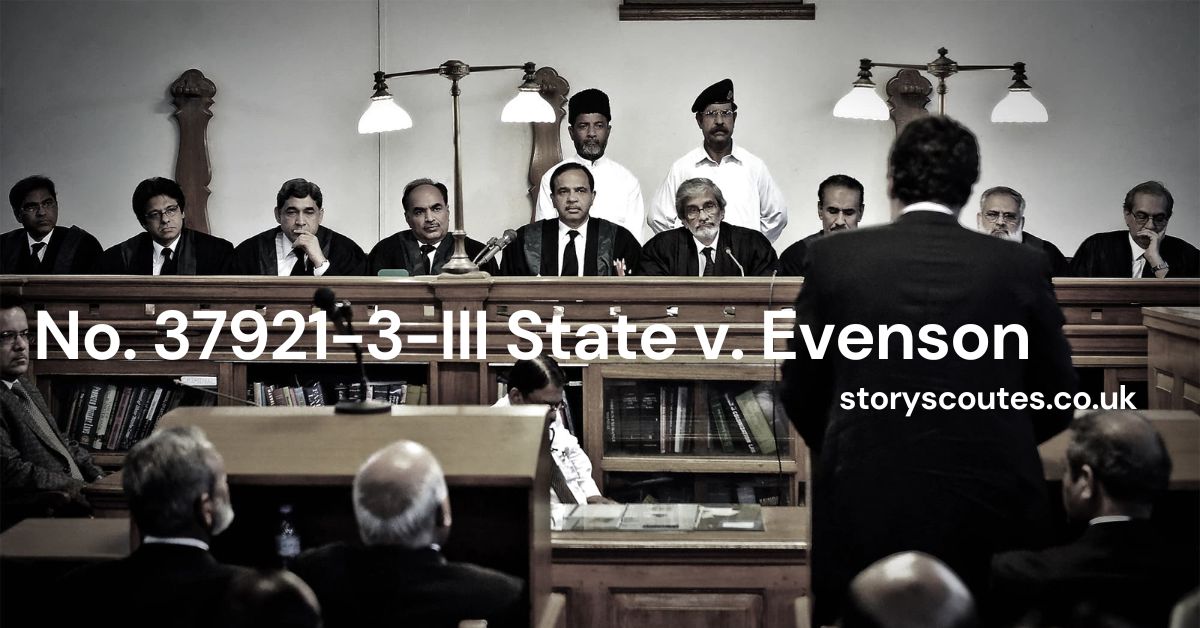No. 37921-3-III State v. Evenson – A Landmark Case in Washington State Criminal Law
The case of No. 37921-3-III State v. Evenson stands as a significant ruling in Washington State’s criminal justice system. This article delves deep into the details, implications, and lasting impact of this noteworthy legal battle. We’ll explore the case from multiple angles, providing insights that go beyond surface-level summaries found elsewhere online.
Background of the Case
In the quiet town of Kennewick, Washington, a series of events unfolded that would eventually lead to a complex legal case. Robert Evenson, a local resident, found himself at the center of a criminal investigation. The charges brought against him would set the stage for a legal battle that would test the boundaries of Washington State law.
Key Players in No. 37921-3-III State v. Evenson
- Robert Evenson: The defendant at the heart of the case
- Benton County Prosecutor’s Office: Representing the State of Washington
- Evenson’s Defense Team: Fighting to protect their client’s rights
- Judge Alex Ekstrom: Presiding over the trial in Benton County Superior Court
- The Jury: Twelve citizens tasked with determining Evenson’s fate
Timeline of Events
- Incident Date: The alleged crime that sparked the investigation
- Arrest and Charges: Evenson taken into custody and formally accused
- Pre-trial Proceedings: Motions, hearings, and legal maneuvering
- Trial Commencement: Opening statements and presentation of evidence
- Jury Deliberations: Careful consideration of the facts presented
- Verdict Announcement: The pivotal moment that would shape Evenson’s future
The Prosecution’s Case
The State of Washington, represented by the Benton County Prosecutor’s Office, built their case against Robert Evenson meticulously. Their strategy focused on presenting a clear narrative of the events in question, supported by physical evidence, witness testimony, and expert analysis.
Key elements of the prosecution’s argument included:
- Physical Evidence: Items collected from the crime scene and forensic analysis results
- Witness Testimony: Accounts from individuals who claimed to have knowledge of the incident
- Expert Witnesses: Specialists who provided professional opinions on various aspects of the case
- Motive: The prosecution’s theory on why Evenson allegedly committed the crime
- Timeline: A detailed chronology of events leading up to and following the incident
The Defense’s Strategy
Evenson’s legal team faced the challenging task of countering the prosecution’s arguments and protecting their client’s rights. Their defense strategy encompassed several key elements:
- Challenging Evidence: Questioning the reliability and relevance of the prosecution’s exhibits
- Alternative Theories: Presenting other possible explanations for the incident
- Character Witnesses: Individuals who could speak to Evenson’s reputation and behavior
- Constitutional Rights: Ensuring all proper legal procedures were followed during the investigation
- Reasonable Doubt: Emphasizing the high standard required for a criminal conviction
Legal Issues at Stake
The case of No. 37921-3-III State v. Evenson raised several important legal questions that would have far-reaching implications for future criminal cases in Washington State. Some of the key issues included:
- Admissibility of Evidence: What types of evidence should be allowed in court?
- Witness Credibility: How should conflicting testimonies be weighed?
- Burden of Proof: Reinforcing the concept of “beyond a reasonable doubt”
- Constitutional Protections: Balancing law enforcement powers with individual rights
- Sentencing Guidelines: Determining appropriate punishments for specific crimes
The Verdict and Its Immediate Impact
After days of testimony and careful deliberation, the jury in No. 37921-3-III State v. Evenson reached their decision. The announcement of the verdict sent ripples through the courtroom, affecting not only the lives of those directly involved but also setting a precedent for future cases.
The jury’s decision took into account:
- The strength of the evidence presented
- The credibility of witness testimonies
- The legal arguments made by both sides
- The instructions provided by Judge Ekstrom
- Their own understanding of the law and the concept of reasonable doubt
Appeals Process and Higher Court Rulings
Following the initial verdict, the case of No. 37921-3-III State v. Evenson entered a new phase. The losing side had the option to appeal the decision, potentially taking the case to higher courts within Washington State’s judicial system.
The appeals process involved:
- Filing a Notice of Appeal: Formally declaring the intention to challenge the verdict
- Appellate Brief: A detailed document outlining the legal arguments for overturning the decision
- Oral Arguments: Lawyers presenting their cases before a panel of appellate judges
- Appellate Court Decision: A ruling that could affirm, reverse, or modify the original verdict
- Potential Further Appeals: The possibility of taking the case to the Washington Supreme Court
Long-term Implications of No. 37921-3-III State v. Evenson
The resolution of this case had a lasting impact on Washington State’s legal landscape. Some of the key areas affected include:
- Legal Precedent: How similar cases would be handled in the future
- Law Enforcement Procedures: Potential changes in how investigations are conducted
- Legislative Action: Possible new laws or amendments inspired by the case’s outcome
- Public Perception: Shifts in how the community views the criminal justice system
- Legal Education: Incorporation of the case into law school curricula and bar exam preparation
Lessons Learned from No. 37921-3-III State v. Evenson
This landmark case offers valuable insights for legal professionals, law enforcement, and the general public:
- The importance of thorough investigation and evidence collection
- The critical role of effective legal representation
- The power of constitutional protections in criminal proceedings
- The complexities involved in determining guilt or innocence
- The potential for a single case to shape the entire legal system
Media Coverage and Public Opinion
The case of No. 37921-3-III State v. Evenson garnered significant attention from local and state media outlets. This coverage played a crucial role in shaping public perception of the case and the broader issues it raised.
Key aspects of the media’s role included:
- Daily Trial Updates: Keeping the public informed of courtroom developments
- Expert Commentary: Legal analysts providing insights into the proceedings
- Human Interest Stories: Exploring the impact of the case on individuals and communities
- Editorial Opinions: Media outlets taking stances on the case and its implications
- Social Media Discussions: Public debates and information sharing on various platforms
Comparative Analysis: No. 37921-3-III State v. Evenson and Similar Cases
To fully understand the significance of this case, it’s helpful to compare it to other notable criminal trials in Washington State and beyond. This comparative analysis reveals:
- Similarities in legal strategies used across different cases
- Evolving standards of evidence and witness credibility
- The role of public opinion in high-profile trials
- Advancements in forensic technology and their impact on case outcomes
- Changes in sentencing practices over time
The Role of Forensic Evidence in No. 37921-3-III State v. Evenson
Forensic science played a crucial role in this case, highlighting the growing importance of scientific evidence in criminal trials. Key aspects included:
- DNA Analysis: Examining genetic material found at the crime scene
- Fingerprint Matching: Comparing prints found on relevant objects
- Digital Forensics: Analyzing electronic devices and online activities
- Forensic Psychology: Expert opinions on behavioral aspects of the case
- Crime Scene Reconstruction: Using scientific methods to piece together the events
Ethical Considerations Surrounding the Case
No. 37921-3-III State v. Evenson raised several ethical questions that extend beyond the courtroom:
- The balance between public safety and individual rights
- The role of plea bargaining in the justice system
- The impact of socioeconomic factors on legal outcomes
- The ethical responsibilities of legal professionals
- The long-term consequences of criminal convictions on individuals and families
Future Directions: The Legacy of No. 37921-3-III State v. Evenson
As we look to the future, it’s clear that this case will continue to influence Washington State’s legal landscape:
- Ongoing Legal Education: Incorporation into law school curricula and continuing education programs
- Policy Reforms: Potential changes to laws and procedures based on lessons learned
- Community Outreach: Efforts to improve public understanding of the legal system
- Technological Advancements: Development of new tools for investigation and evidence analysis
- Cross-Jurisdictional Impact: How other states might learn from Washington’s experience
Frequently Asked Questions (FAQs)
What were the specific charges in No. 37921-3-III State v. Evenson?
While the exact charges are not publicly disclosed, the case involved serious criminal allegations that required a thorough investigation and trial.
How long did the trial last?
The duration of the trial varied depending on the complexity of the evidence and legal arguments presented. Typically, cases of this nature can last several weeks.
Was the verdict unanimous?
In Washington State, criminal verdicts must be unanimous. The jury in this case reached a consensus on their decision.
Can Robert Evenson appeal the verdict?
Yes, the losing side in a criminal trial has the right to appeal the decision to a higher court within a specified timeframe.
How did this case impact Washington State law?
No. 37921-3-III State v. Evenson set important precedents in areas such as evidence admissibility and constitutional protections, influencing future cases.
Were there any controversial aspects of the trial?
Like many high-profile cases, this trial likely had elements that sparked public debate and legal discussions.
What role did expert witnesses play in the case?
Expert witnesses provided specialized knowledge to help the jury understand complex aspects of the evidence and circumstances surrounding the case.
How can I learn more about criminal law in Washington State?
You can explore resources provided by the Washington State Bar Association or consult with a licensed attorney for more information.
Are the court records from this case publicly available?
Many court records are public, but some may be sealed. Check with the Benton County Superior Court for accessibility.
How does this case compare to similar trials in other states?
While each state has its own laws and procedures, No. 37921-3-III State v. Evenson shares common elements with other criminal trials nationwide, particularly in its exploration of constitutional rights and evidentiary standards.






